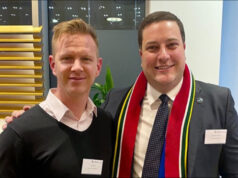Many of us South Africans have money moving between SA and the UK for many different reasons. Paul Harrison sits down with Herman Howell of Sable FX to get his top three insights on how to get the most out of the process.
Insight 1: Know why you need to transfer
No two individual’s circumstances are the same – if you’re paying off a mortgage then it’s probably best to send X amount each month so that you benefit from Pound-cost-averaging (investing equal monetary amounts regularly and periodically over specific time periods). By splitting your large transfer into several amounts, you also leverage yourself against any currency risk; the risk that the rate will go up or down.
Similarly, if you there is no need to transfer the money, rather be patient and speak to a financial advisor to see if you cannot invest the funds in an ISA, for example, while you continue saving or sending small amounts on a regular basis. If the Rand does suddenly weaken (as it’s done in the last month following the mining strikes), then you are in a position to capitalise.
Insight 2: Follow the markets, or speak to someone who does
Generally speaking, the Rand follows the Euro. If the Euro buckles, the Rand follows. If the Euro strengthens, the Rand usually strengthens – and so on. Without going into too much detail, it comes down to investor sentiment – if there is doubt in the market, riskier currencies like the Rand weaken and vice versa. There are a lot of doubts surrounding the Euro so it is worth keeping an eye on how things develop over the next few month.
Find out about upcoming key decisions that could influence the exchange rate and how currencies are likely to react to certain events. Of course we cannot tell what the future holds, but we need to be prepared in the best possible way.
Insight 3: Shop around – register with more than one forex company
Anyone who loves shopping will tell you that the best way to find the best price is to shop around. Everything is negotiable; register with more than one forex company and then compare their rates and charges – especially if you are sending a large amount.
Q&A: Natalie Granger is a London-based South African who has interests in SA and the UK and has a few questions on foreign exchange/ money transfers
I’m selling my house in the UK, should I transfer everything home?
That is entirely up to you and whether you need the funds in SA. It never hurts having money in different currencies, so it might be best to transfer a portion home and then leave some of the Pounds in investments in the UK. If the rate does improve, you will be in a position to transfer straight away.
How do companies make money if transfers are ‘free’?
Unlike banks, FX companies generally do not spend millions on advertising and the like. As such, the margins they make of clients are much smaller than what a bank would make. FX companies have access to wholesale rates which are unavailable to the individual. So it comes down to economies of scale; if you purchase hundreds of millions of Pounds a year, you’ll get better rates than someone purchasing a few thousand. In short, FX companies do make money on the exchange rate, but much less than banks.
Do you know what the exchange rate will be next month?
If I knew what the rate would be in a month’s time, I’d be writing this from my yacht in the Bahamas while sipping on cocktails with little straws in them. I can assure you I’m not. There is no way of knowing what the exact rate will be; we can however use information available to make a forecast, although many would see this as glorified gambling!
www.thesouthafrican.com











